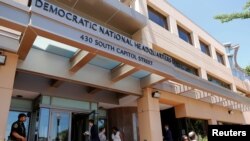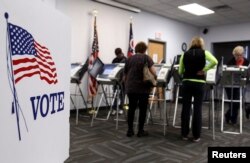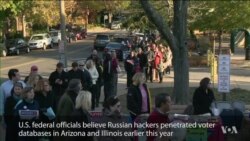U.S. lawmakers of both political parties told VOA they have no reason to doubt that Russian hackers are targeting America’s voting infrastructure with the possible intent of disrupting or undermining confidence in the November elections.
“I don’t think it’s a stretch because Russia’s been engaged in cyberattacks against the United States,” said Republican Senator John Cornyn of Texas. “These are well known to our national security experts. So no, it does not surprise me.”
“We know Russia has been very active in cyberattacks in the United States, and we know that they mine for information all the time,” said Senator Ben Cardin, a Maryland Democrat. “Nothing surprises me about Russia.”
Decentralized voting
Federal officials believe Russian hackers penetrated voter databases in Arizona and Illinois earlier this year, and have urged all 50 states to be vigilant.
“There is an increasing level of sophistication by cyberattackers across the spectrum, whether it’s nation-state actors, plain criminals,” said Homeland Security Secretary Jeh Johnson on MSNBC. “And so we want to inform state election officials of what we see on a national level as best practices.”
While acknowledging a threat exists, Johnson downplayed the possibility of a foreign entity managing to alter ballot totals in any state. He noted that, while the vast majority of voting machines in the United States are electronic, they are not linked to the Internet, and results are collected and reported by local election officials at polling stations.
The White House, meanwhile, has stressed that America’s decentralized elections system makes it harder to tamper with on a grand scale.
“Elections are administered and conducted by state and local authorities, which essentially means you have a patchwork of systems across the country,” said White House spokesman John Earnest. “That also makes it harder to hack the system.”
Intelligence view
A top U.S. intelligence official on Wednesday played down the recent reports of Russian hacking into U.S. voter databases and political institutions.
WATCH: US Intelligence Chief Says Russia Hacks US Computer Networks 'All the Time'
“The Russians hack our systems all the time, not just government, but also corporate and personal systems,” Director of National Intelligence James Clapper said during a national security summit in Washington.
“People are feeling uncertain about what will happen with presidential transition,” he said. “I’m here with message — it will be okay.”
Clapper stopped short, however, of placing blame for the recent Democratic National Committee hacks directly on Moscow. He said China and non-state actors also are threats in the cyber-terror world that are unlikely to go away.
“Cyber will continue to be a huge problem for the next presidential administration, as it has been a challenge for this administration,” he said.
Disinformation victory
The mere fact that Americans have been alerted to cyberattacks on voting systems, though, could be a victory for a hostile foreign entity, according to the chairman of the Senate Foreign Relations Committee, Republican Bob Corker.
“Anything that the Russian leadership can do to cause Americans to distrust the validity of an election destabilizes our country,” Corker said. “If they can demonstrate that maybe they affected it [an election], so that all of a sudden there is distrust in the outcome, obviously it creates instability.”
“It’s a win for them,” Corker added.
Russia denies responsibility
Russian President Vladimir Putin has denied any attempts to meddle in U.S. elections, and said Russia was not to blame for a cyberattack on the Democratic National Committee and the subsequent release of thousands of DNC emails.
Republican Dan Coats of Indiana, who serves on the Senate Intelligence Committee, said he wants to see definitive proof of Russian involvement before he points any fingers.
“We are going to need to find the factual basis to come to a conclusion, but given the ability today to basically intercept anybody’s communications, we are all vulnerable to that," said Coats.
If conclusive evidence emerges that cyberattacks on U.S. elections systems originated in Russia, they will be assumed to have been directed or at least sanctioned by Putin, according to Cardin.
“It’s a pretty-well centralized government. So you have to believe that, [at] the highest levels, these strategies have been agreed to,” the senator said.
Elizabeth Cherneff contributed to this report.







